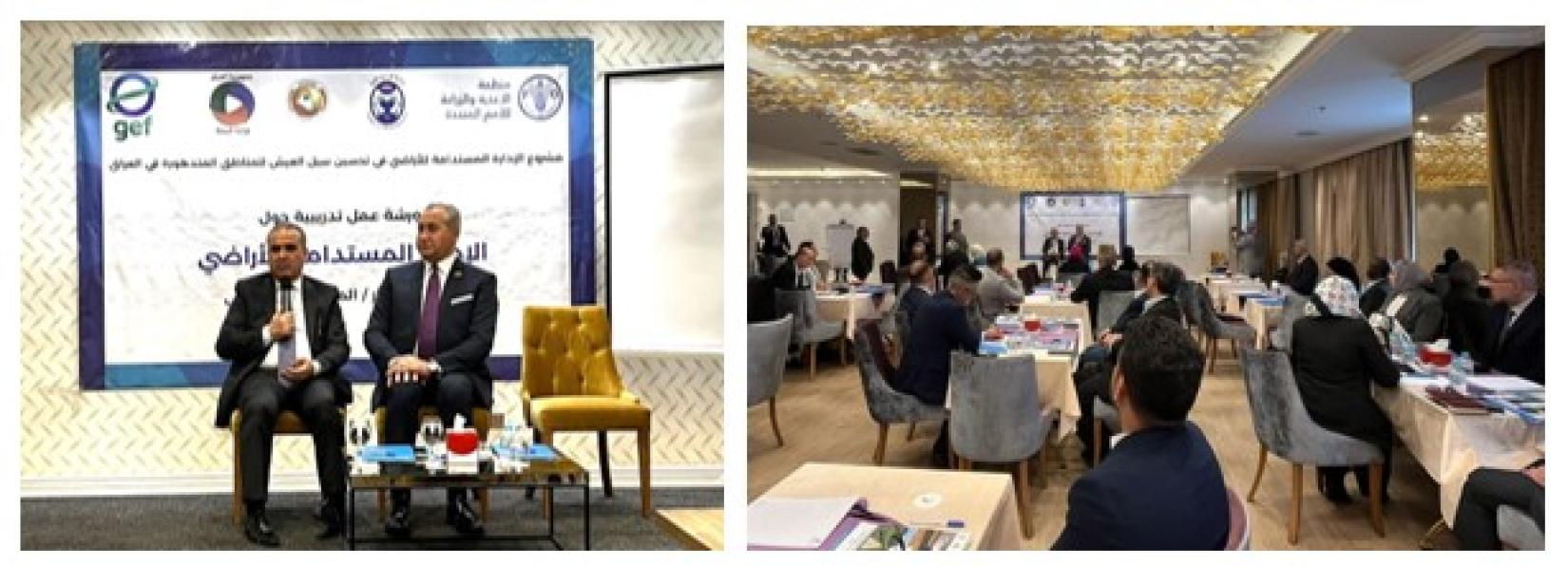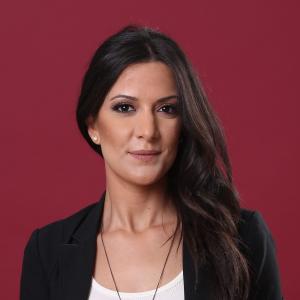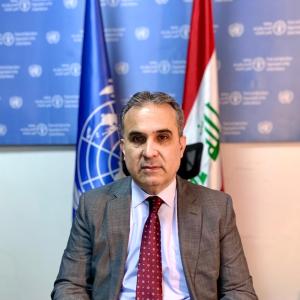FAO and the Ministry of Environment: Starting the implementation of a Comprehensive Training Program on Sustainable Land Management Policy formulation with Support from the Global Environment Facility
13 February 2024
Basra, Iraq - February 13, 2024 - The Food and Agriculture Organization (FAO) of the United Nations in Iraq, in collaboration with the Iraqi ministries of Environment, Agriculture, and Water Resources, has launched the inaugural workshop on formulating Sustainable Land Management (SLM) Policies. Supported by the Global Environment Facility (GEF), this innovative initiative aims to equip national decision-makers with the requisite skills and knowledge to advocate for and implement SLM policies effectively. This comprehensive effort underscores a joint commitment to combatting land degradation and promoting environmental sustainability in Muthanna and Thi-Qar governorates, aligning with Iraq's sustainable development objectives.

Through the project "Sustainable Land Management (SLM) for Improved Livelihoods in Degraded Areas of Iraq," FAO and its partners are working to address issues related to land degradation and environmental sustainability by supporting national policy frameworks to promote SLM practices tailored to the unique challenges faced in Southern Iraq. By fostering strategic capacity-building and collaboration between governmental and local stakeholders, this initiative also aims to pave the way for sustainable land and water resource management, thus ensuring a resilient ecosystem and improving livelihoods for communities in the region.
The inaugural workshop, which will be held from February 13 to 15, 2024 in Basra , brings together 40 participants representing various governmental agencies and farmer associations. Over the next weeks, two additional cohorts will convene in Basra and Baghdad to ensure the comprehensive training of all 120 participants enrolled in the program.
In his opening speech, HE the Deputy Technical Minister of Environment, Dr Jasim Abdulazeez Alfalahi, emphasized the significance of the collaboration with FAO and other partners, stating, "The Sustainable Land Management project is a crucial step towards addressing environmental challenges in Iraq. The collaboration with FAO and other ministries highlights our commitment to implementing sustainable practices and safeguarding our natural resources for future generations."
For his part, FAO Iraq Representative Dr. Salah El Hajj Hassan stressed that this initiative part of FAO's commitment, in collaboration with its partners, to support Iraq in achieving sustainable development goals. By empowering decision-makers with the necessary tools and knowledge, we aim to foster resilient agricultural systems that achieve environmental sustainability, and social well-being."
Under the expert guidance of FAO project team , participants will delve into a diverse range of topics essential for effective SLM policy formulation and implementation during the three-days of the training workshop. This includes policy integration, government efficiency, and sustainable agriculture practices.
Post-training, participants will be able to anticipate significant improvements in planning, governance, and policy frameworks within ministries, facilitating the implementation of agricultural systems that not only produce but also preserve, contributing to global environmental benefits and enhancing climate resilience.
This initiative contributes to several Sustainable Development Goals (SDGs), including SDG 2: Zero Hunger, SDG 13: Climate Action, and SDG 15: Life on Land.


He started his career in 1984, as Senior Research Assistant in the Agricultural Research and Education Centre (AREC), American University of Beirut. From 1987 to 1991, he was Coordinator of the Student Training Programme, and also Agriculture and Horticultural Teacher for the Faculty of Agriculture, at the Lebanese University.
From 1991 to 1995, he worked as Agricultural Engineer at the Ministry of Agriculture, Bekaa Regional Office, Zahlah and was then assigned to the Agricultural Research Institute in the Tal Amara station, first as Head of the Crop Production Department and subsequently in charge of the Plant Protection Laboratory. From 2002 to 2006, he was Director of the Kfardane Research Station (Agricultural Research Institute). In 2008, he became Visiting Scientist at the International Maize and Wheat Improvement Centre (CIMMYT) and Coordinator of a project with the International Centre for Atomic Energy Agency, Vienna.
In 2010, he served as Advisor to the Minister for Agriculture of Lebanon. In 2011, he became President of the Pesticide Scientific Committee, Head of the Phytoplasma Committee and Director of the Agriculture and Rural Development Programme (ARDP) (EU-funded project). From 2010 to 2013, he represented Lebanon in negotiations with EU, Egypt, Jordan and Iraq. During his career, Mr Hajj Hassan also carried out a number of other functions. He represented the Lebanese Agricultural Research Institute (LARI) in several research programmes with the International Centre for Agricultural Research in the Dry Areas (ICARDA) and the American University of Beirut. He was Coordinator of the Mashreq/Maghreb project with ICARDA, representing Lebanon in the Steering Committee, as well as being the Head of the Sugar-beet Delivery and of the Wheat Delivery Committees. For a number of years, Mr Hajj Hassan worked for the preparation of FAO TCP projects and served as the National Director of a TCP project. He joined FAO in January 2014 as FAO Representative in Yemen. Mr Hajj Hassan succeeds Mr El Zubi as FAO Representative in Iraq.


